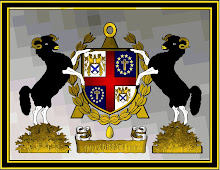Those who believe in the existence of a Creator God that made all things are routinely denounced by secularists and Darwinists as, among other things; “anti-science, superstitious fools”. The supernatural features of God, they say are an affront to science. God cannot exist because He cannot be verified by the scientific method. You cannot see, feel or measure Him. Well there you have it. Science rules, has spoken and all you superstitious, knuckle dragging, cretins had better get out of your Bibles and into the 21st century!
Well I have some bad news for the Bright Ones. Science is not The Master of Knowledge but only one among the tree of academic branches which are subject to Logic, The Great Organon, the set of formal principles which govern all knowing. One cannot investigate, know or communicate anything without the order established by Logic. Science is lost without it. What Science cannot do its Master can. To illustrate Logic’s lordship, let’s use it to try and prove God by the unscientific disciplines of Literature and Music.
“To be or not to be; that is the question”. So said the noble Dane. In his lament reposes the answer to the question of God’s being. As a matter of logical law, a thing can be nothing other than what it is. A dagger cannot be a flower and remain a dagger. As the distraught Prince agonizes over fate, he understands that he must either be [alive] or not be [dead], a person or a corpse. By this we know that neither a prince nor anything at all can create itself. To do so it must be and not be at once. If he was to be, Hamlet must have been created by someone else. Of course he was created by William Shakespeare who did not at all spring from himself.
One cannot create without thinking and Descartes great truth, cognito ergo sum places thinking and thus creating as personal characteristics. Hence, we know from the existence of the play Hamlet that The Bard was at one time a living, thinking, creating person who was, himself, brought into being by another.
Jumping forward a few hundred years we come to another creative man. Billy Preston extolled in song the iron Law of Logic, ex nihilo nihili fit; “nuthin from nuthin leaves nuthin." Not even the “fifth Beatle” or for that matter, all The Beatles together could craft something from nothing. Preston’s song leaves no doubt that there must be, from eternity, something, for if there was ever nothing [no thing], neither Shakespeare nor The Beatles nor you and I nor anything else could be.
From the above flows the inevitable conclusion that men exist and have life. Men think and write and sing and they record their thoughts on inanimate material like vinyl and paper which in turn are created from some other substance. Undeniable also is the truth that men are not eternal, and did not create and endow themselves with life. Whence then, cometh man?
There is in the study of knowledge a formal proof called The Argument from Necessity. This argument takes the form of the syllogism: If A is true and B is true then C - by necessity - must also be true. If [A] Spot is a dog and [B] all dogs bark then [C] Spot must bark. That Spot barks is true whether or not anyone at anytime hears his croon. Using this formal investigative tool in the current case we can write stipulating that men are living beings, did not create themselves and are made of something:
If men are beings and are alive [A]
And;
If men did not create themselves [B]
And;
If men are made of something [C]
Then:
[D] There must be – by necessity of sufficient cause – some thinking, creating, personal, being, eternal, possessed of both matter and life and the will and power to create and give life. God. The conclusion is irrefutable. It is formally true and must be true whether or not anyone at anytime has ever seen or heard God.
I am a poor philosopher with woefully little training. Those who will attack me as sophomoric, foolish or worse are likely to be very educated men and women with advance academic and scientific degrees. Until these great minds, however, can explain man and his attributes and explain away the necessity and sufficiency of God without traversing the limits of coherent thought, they might do well to consider just whom the fools are?
skip to main |
skip to sidebar
About Me
- J. Robert Brock Hacker
- Mr. Hacker is a Christian an Urban Planner and Land Developer.He lives with his wife of 38 years in Lexington, Kentucky




